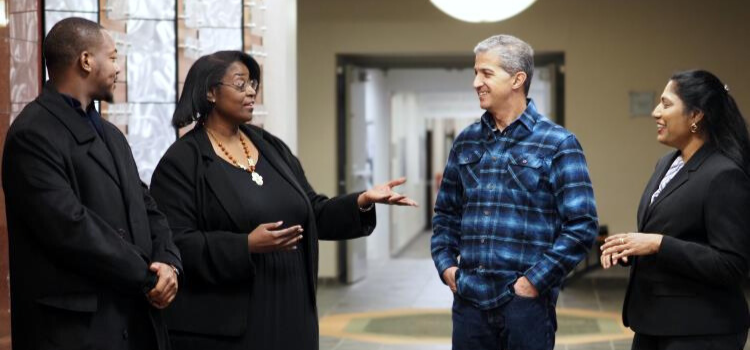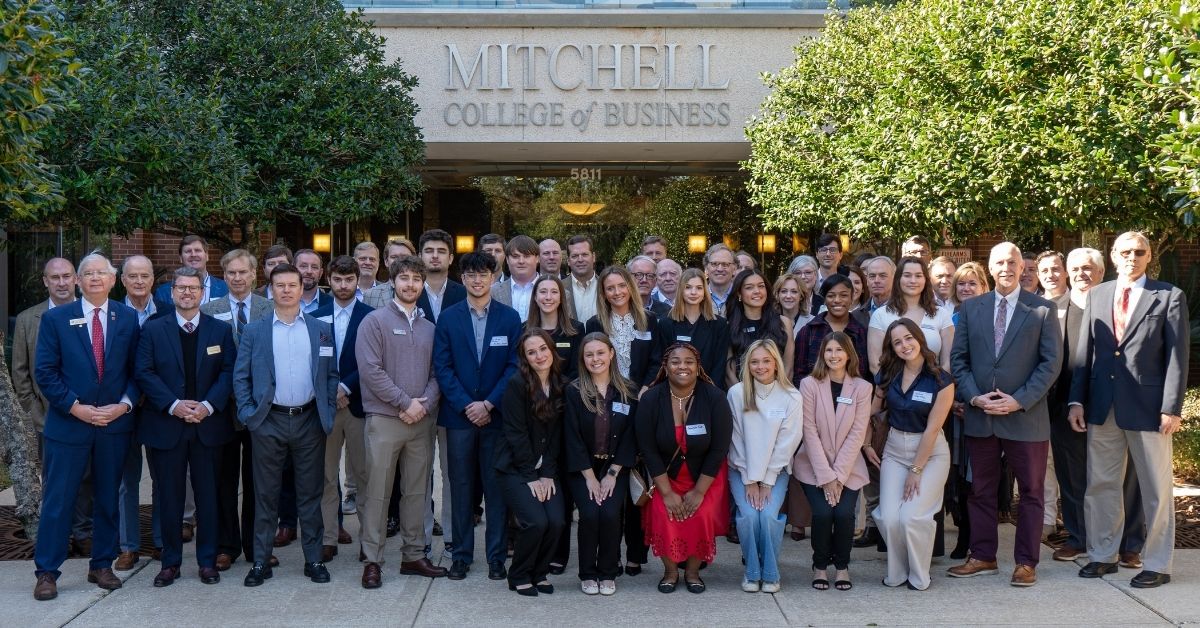Engineers build business acumen in MBA program
Posted on April 27, 2023 by MCOB Outreach

On the job as an engineer at Chevron’s plant in Pascagoula, Mississippi, Mordecai Israel realized quickly that the path to executive management required more than his ability to keep machinery working.
Leading her own startup IT business in Singapore, Alamelou Sivapragasam discovered that technical expertise wasn’t enough for business success.
And Paulo Goncalves, too, saw that success at global steel producer AM/NS could be enhanced with a broader view of the business than his career as a mechanical engineer could offer.
All three have excellent engineering credentials. And all three realized that building their business acumen would broaden their options moving forward – leading them to enroll in the Master of Business Administration program in the Mitchell College of Business.
Mordecai Israel
Israel had a rocky road through high school in Georgia and was working part-time in fast-food when his parents pointed out that he needed to change course if he wanted to go to college. At the time, he hadn’t really thought about college, but that nudge was enough for a recalibration. He boosted his grades, completed an electrical engineering degree at Alabama A&M University and earned a master’s degree in electrical engineering from South.
Now he’s working not only on the MBA, but also a Ph.D. in systems engineering. In addition to his job as an instrumentation controls and electrical design engineer for Chevron, Mordecai recently began a career in real estate and sold over $1 million in homes during his first year.
He loves the economic theory and financial information he’s encountered in the MBA program.
“At work, I like to get into the financials and see how we make our money — how does engineering impact the financial?” Israel said.
Beyond the workplace, Israel says the MBA coursework is also helpful for handling his own money. “It’s changed my viewpoint on how money works.”
Alamelou Sivapragasam
Born and raised in India, Sivapragasam had completed her electronics and communication engineering degree. After marriage she moved to Singapore. She worked in software engineering, consulting and project management for 17 years before launching her own business. Three years into that new venture, her husband was transferred to Mobile and she joined him.
Looking for her own path forward in the U.S., she opted to start the MBA program.
“To perform well in a job,” she says, “you need to think in terms of business. It’s not just doing the job, but knowing the purpose of your job within the organization.”
She has found classes on leadership, accounting, economics and business management particularly helpful. So helpful that she recommends that anyone who’s completed a few years of work should consider an MBA “so they can see how their contributions help their organization achieve its goals.”
Engineers tend to concentrate on solving problems, but, she says, they also need to understand management’s vision and learn how their work affects an organization's budget.
Sivapragasam is doing the health care concentration within the MBA program. “My aim is to use my IT expertise to speed up the processes in the medical field where prompt service is important.”
Paulo Goncalves
A native of Brazil, Goncalves is a mechanical engineer, working as a reliability engineer at AM/NS steel mill in Calvert.
A started his career at a mill in Brazil that became part of ArcelorMittal, a global steel producer that encourages its employees to work at other locations in its worldwide network and also to continue learning throughout their careers.
Goncalves decided to take advantage of both those suggestions. He transferred from Brazil to Alabama, to the mill that converts slabs of steel into more usable coils. “It’s a beautiful and challenging process — ” he says.
Why an MBA?
“Even though I worked for many years as a manager there, I needed something to supplement this part of my knowledge,” Goncalves says. We have to deal and manage projects with different teams, , in many ways this can enhance my managerial skills
“Its very challenging — it’s not my native language and I’m trying to learn how college works here. And it’s a long time since I sat on a school bench. But I like to learn new things.”
The concepts from his classes are proving useful, he says, but learning to connect the dots through accounting and to learning different management techniques have been most beneficial.
“I had done managerial training during my work in Brazil — however, this is much deeper, very interesting.”
“It’s giving me a better insight into different aspects of how the company functions.”
-

Supply Chain Major Clayton Howell Claims Alabama State Title in Microsoft Excel
The Mitchell College of Business is proud to recognize Clayton Howell,...
February 19, 2026 -

Foundation for the Future: Industry Leaders Invest in Mitchell College Real Estate Program
A new era of the Mitchell College of Business real estate program bega...
February 2, 2026 -

Accounting Students Offer Free Income Tax Prep
Accounting Students in the Mitchell College of Business will be prepar...
January 29, 2026 -

Dr. Mickey Smith Receives Sam and Bonnie Rechter Research Grant
Dr. Mickey Smith, Associate Professor of Management for the Mitchell C...
January 8, 2026
